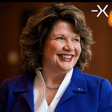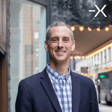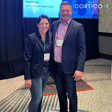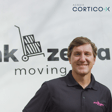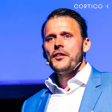Become a Creator today!Start creating today - Share your story with the world!
Start for free
00:00:00
00:00:01

How to support the sandwich generation, with Karol Jennings and Emily Young
The role of carer is an underappreciated and yet essential part of our social fabric. Looking after young children or elderly parents can be a full-time job. So what happens when a carer needs to do both at the same time. This Herculean task is what faces the sandwich generation: a group of middle-aged adults who care for both their aging parents and their own children.
How can businesses do more to help those who help others? To answer that question, Will is joined by Karol Jennings, Director of Enterprise Patient Experience at Providence, a not for profit US Healthcare system, and Emily Young, Principal at Cortico-X.
Get in touch with Cortico-X here.
Follow Cortico-X on LinkedIn here.
Transcript
Introduction to Cordico X and the Sandwich Generation
00:00:00
Speaker
Cordico X is an experience-led transformation business that partners with clients and technology companies to drive digital acceleration. We are experience activists, passionate about elevating everyday human experiences through the belief that what's best for people is what's best for an organization. Reach out to us for a chat. A link is in the show notes.
00:00:34
Speaker
Hello and welcome to Speaking from Experience from CordicoX, where we speak to the people with experience of experience. I'm Will Kingston. The role of carer is an underappreciated and yet essential part of our social fabric. Looking after young children or elderly parents can be a full-time job. So what happens when a carer needs to do both at the same time?
00:01:00
Speaker
This Herculean task is what faces the sandwich generation, a group of middle-aged adults who care for both their aging parents and their own children. Healthcare providers have been slow to respond to the needs of this group of men and women across the United States, a group that will only continue to grow as the population ages. That's not good enough. How can healthcare providers and indeed businesses across industries do more to help those who help others?
Personal Experiences of the Sandwich Generation
00:01:30
Speaker
To answer that question, I'm joined by Carol Jennings, Director of Enterprise Patient Experience at Providence, a not-for-profit US healthcare system, and Emily Young, Principal at CordicoX. Welcome to you both. Carol, I will start with you. You yourself are a member of the sandwich generation. Tell me your story.
00:01:50
Speaker
That's alright. So if we're thinking about a sandwich, I'm there in the middle. My adult parents are in their 70s. I have a mom that technically requires round-the-clock care. She shouldn't be left at home. And so my dad is facing that as well as just his own aging self.
00:02:09
Speaker
I am a single mom, so it's just me. So there's not a second set of adult parents at least, but there's also not a sibling to rely upon. And then on the the bottom part of the sandwich are my two daughters. I have a high school student and a middle school student, extremely active in sports and music and such. So that's a busy part of the bottom of the sandwich.
00:02:30
Speaker
And luckily for me, my parents live somewhat close. We're in the same state, but it does require a ferry ride and about a 70 minute car ride in order to, to get to their home. They live in a rural area. So just some, some more of the interesting little dressing, I guess you could throw on the sandwich. Emily's is Carol's story unique or is this something that as a professional working in experience management, in healthcare, something you're seeing more and more?
Challenges Faced by the Sandwich Generation
00:02:59
Speaker
Unfortunately, Carol's story is not unique. We're seeing this very frequently and it's only going to be a bigger and bigger problem and reality of life as the boomer generation starts to move in into retirement and we start to live longer. We're seeing about one in five adults in the U.S. are now taking on this role of caregiving for their parents and their children.
00:03:22
Speaker
Astonishing number, isn't it? And in your experience, Emily, I'll stick with you here. Are healthcare care providers on the ball or is this something where you feel like they are perhaps behind the curve in how they address the needs of this growing group of people? I think there's a lot that healthcare care providers and also other businesses can be doing to help support this generation. We're seeing a lot of time loss coverage, time management and responsibilities, mental health concerns.
00:03:50
Speaker
across the board for those who are actually finding themselves in this generation. So when you think about what can we do from a healthcare perspective, but what can you do also as an employer somewhere else to so support your employees who are going through this experience? We'll get back to what businesses and healthcare providers can do, and perhaps some lessons for them a bit later. But I want to understand the sandwich generation more deeply first, and I'll go to you, Carol. Emily just flagged a couple of challenges that I imagine you would face in your day-to-day life.
00:04:18
Speaker
but What are the big challenges for you that you feel that you have to grapple with as a member of the sandwich generation dealing with both youngish kids and elderly parents?
00:04:29
Speaker
I'm going through something right now that I think perfectly tells the story of that. My mom recently had a pulmonary embolism and had to be airlifted to a hospital because as I mentioned, they live in a rural area. So then that really tightened up what kind of care she was going to need. So she has to be supervised to make sure she takes her medications.
00:04:54
Speaker
she She can't be left alone because she has dementia and she'll start calling people. She's a florist, all of these kinds of things. So my dad is, for lack of a better term, a little bit of a prisoner in the home. And he has hobbies. He needs to take care of his self as well. And I feel, oh, I should go over there and relieve him of the burden of taking care of my mom so he can be a full human and enjoy things outside the home.
00:05:21
Speaker
but to in order to be able to go there, then that means I have to figure out who's going to take my kids to their practices. They have the first day of school coming up. And so my dad had asked next week if I could come and help with my mom so he could go to something and I can't do it. My kids have their first day of school. They have all these things they need to be at.
00:05:42
Speaker
and i had to tell him no i'm sorry i can't go so now you can't do the thing that you wanted to be able to do and i feel horrible guilt i'm worried about my dad's mental health i'm worried that he'll wind up just asking a friend to come and check on my mom and so now She's just home by herself probably not taking her medicine and um definitely scary if she were to fall or try to drive the car. So I have all of that going on and I'm also taking these classes trying to get back in shape and worried about my own my own care and my own career and what's going on.
Navigating Parental Care and Resistance
00:06:17
Speaker
So those are all of the things I'm facing. I am not able to look at their medical charts
00:06:23
Speaker
Currently, I'm not able to talk directly to their providers, so everything I get from them is secondhand. And they really see me as their 13-year-old little girl anyway. They don't see me as a person who works in healthcare, care even though I just admittedly, you know, I have an administrative role. I'm not going to be able to do anything clinically for them. But I could help them navigate the system, and they don't recognize me as a resource for that.
00:06:49
Speaker
So there's lots of emotions and ah triggering behaviors that are are boiling to the surface. And long-term, and those are the short-term problems, but long-term, I know they have a trust. I know they have an outdated will somewhere. I have no idea where it is. They have a big house full of stuff.
00:07:08
Speaker
It gives me anxiety just thinking about having to go through that and look for who would I call in the event that you know my dad needed someone to make medical decisions about him. I don't even think I'm the power of attorney. So it's scary. Well, I'm scaring myself just talking about it right now.
00:07:29
Speaker
You touched on a very important topic of that you don't have access to their information. You can't help them make the decisions that even if you could provide someone else to come in and help kind of alleviate that role, whether it be a paid for caregiver, a worker with a hospital, something along those lines, there's resistance within your family. I wonder if you can talk a little bit more about that.
00:07:52
Speaker
Yeah, I think there's a lot of denial, which I think is common with a newer dementia diagnosis. A lot of folks tend to really want to exercise their independence. There's a lot of masking. So I hadn't been there in a couple of months and I went there and the house was not kept as it usually was. And you could see things that had been purchased to try, gimmicky things that had been purchased to try to make certain things around the house easier. But there was just a lot of pride around not wanting to ask for help. And then there was frustration on my part. And I don't know how to say, every time I call my dad, he's on speakerphone with my mom there.
00:08:38
Speaker
It's just very difficult to get them to talk to me about what they want and also difficult to get them to listen about things I'm an expert in. I know about setting up home care. I worked in that field for about a decade. I know about setting up assisted living, if that's the case. I know even the the basics about making a home safe for an elderly person or a person with dementia.
00:09:07
Speaker
and I am completely disregarded. it's It's hurtful and it's frustrating and it makes me want to throw up my hands and say, well, I have this other thing going on. and My kids are are watching this all unfold and it's, I think, confusing and scary to them. We have a lot of humor in our household and so we try to just laugh our way through and do the best we can. But it's it's odd for my my kids as well. Just some of the things they've seen when we go to see Grandma and Grandpa, it's not the same visit that it used to be. It's not fun anymore.
00:09:43
Speaker
This is sometimes called the giving up the car keys phenomena, and we've even seen that presidents may have issues sometimes with recognizing that they've lost a step or two, let alone everyday people. So it's not uncommon at all.
Mental Health and Support Systems for Carers
00:09:59
Speaker
The undercurrent in that answer, which is so powerful, Carol, this obviously takes an emotional toll, and I imagine it takes a toll on your mental health as well.
00:10:09
Speaker
Namely, I'll go to you. The mental health concerns that surround the sandwich generation are very real. What have you observed with regard to mental health and perhaps what would be your reflections on how someone in Carol's position can manage those concerns? Well, I think that, you know, upwards of 80 percent of folks who are in the sandwich generation would say that they struggle with mental health issues. As you can see, there's almost not a way not to. You're balancing a lot of other people's well-being.
00:10:39
Speaker
in addition to your own. And that's actually the biggest thing that we see is people's own mental and physical health starting to decline as they are taking on those caregiver duties. So taking that time out, like Carol mentioned, to go to a workout class, to cook for yourself, not just to cook for those around you. When people are caring for both sides, they'll often make a meal for their parents, a meal for their kids, and then scrap around whatever they have.
00:11:03
Speaker
on the in-between to eat for themselves. So I think that there's a lot of ways in which we can think about how do we really support that middle group, whether it is emotional groups and finding support with people around you, finding help. I think you mentioned at one point parents of other children who can help take that burden when you need to drop your kids off, take them to it practice, things like that. We don't think about care and our parents in that same way sometimes. And so what are the ways that we can bring other people in, make our parents comfortable,
00:11:33
Speaker
I think that's the biggest gap that this as Carol was talking about is the most difficult to overcome is getting our parents comfortable and getting that generation to accept help in different ways. One thing Carol, which we've barely even mentioned because it feels like that you are well and truly overloaded dealing with kids and elderly parents. You also have a full-time job and you are in a senior role at Providence. How does that fit into the story for you?
00:12:00
Speaker
Well, I'm going to give a shout out to Providence. I joined them during 2020. So I was the first wave of employees to join without the the old way pre-COVID. So we got a virtual orientation and we did have an office at first, but it soon became fully remote and this position is incredible in that it offers me flexibility. I'm working from home so
00:12:32
Speaker
My kids can reach me more easily if they need to. I'm able to attend a lot of their events. I'm able to, I could take my computer and work from my parents' home. So that is an incredible blessing for me. But there is a small amount of travel involved. So that's always a bit of a challenge to figure out, okay, who's going to watch my kids and then who's going to be in charge of my parents if something were to happen. So there's that. But a few other things that Providence offers in the way of benefits, there is a benefit if I ever get to the point where I could get my parents to allow it, where you can access adult supervision. I guess I would call it not not like the same as like babysitting, but it would be like adult daycare. So you're able to access that. And there's also very good
00:13:23
Speaker
time off policy. And I would also say the culture, at least in the department I'm in, is extremely understanding about needing to take care of family in general, whether that's kids, parents, or even yourself. Or um I would say that Providence does ah a really good job of that. So if that's something that other employers could also embrace and model, that does a lot to help. And Providence also has free mental health services. So I think it's therapy that you can access, not just for yourself, but anyone who lives in your home. And that is also an incredible benefit that I think a lot of Providence employees underutilize, but but very helpful in regard to this. ah The other I think amazing thing is being able to take my story and what I'm going through and think about
00:14:13
Speaker
how we can use that for others. And I know everyone's different and everyone, I'm not saying, oh, everyone has the same story as me or needs to be set up in the same way that I'm set up when it comes to a healthcare care experience. But I do think it gives me insight and I think it's a privilege to be able to use that insight to influence as we're creating the Providence experience or the healthcare experience. So I'm extremely grateful for the position that I'm in and grateful to bring my story to it and and see how that can be used for future people to have less of a difficult time.
00:14:50
Speaker
We will expand on the corporate response to, or the corporate strategies that can be ah ah can be implemented to help salmon generation in one moment. Just before we do, um um I want to pull on the strand that seems to be an undercurrent of so many of the talking points so far, and that is the resistance of your parents or from seeing elderly people to make changes to their lifestyle as they get older.
00:15:17
Speaker
And I just wonder, and and this may be difficult to answer, but do you think that part of the reason they do not take your advice, despite you being objectively a professional in this line of work, is because you are their daughter because they still see you as their daughter. Do you think they would have a different response to someone who was a third party? Absolutely. My mom's most trusted person outside of my dad is actually this very kind pharmacy.
00:15:45
Speaker
I actually believe it's a pharmacist, not a pharmacy tech. And they that's where she fills her prescriptions. And she thinks this person is the see-all be-all. They have been consistent in her healthcare care over the last 10 years. And at one point, they moved pharmacies in her little town and she moved all her prescriptions where that person is. And that's an interesting thing too, because they live in a rural area, there's a lot of turnover.
00:16:09
Speaker
for the primary care provider that she sees. So this person has been consistent and she she feels safe with them. And I'm glad for that. Anyone they can find that they trust that I also think well will be trustworthy. I'm very glad when we find that. There's actually a few other family members who don't live in the area, but who I see them looking to for for good advice. But um yeah, as far as me, I did have a conversation with them once and I said, wow, it really seems like you see me.
00:16:45
Speaker
as I'm 10 years old and my dad said, oh no, I see you as 13. He said that and it's just ever present that they they don't really understand what my job is and and how it could be useful to them. And there was a time where I went through with my dad, just as I would a client in home care and explained to him all of the things that I thought would be helpful. When he asked me, he asked me about taking care of my mom and he listened to what I said and then he sighed and he said, I just wish I could find someone to tell me what to do. So I died a little inside hearing that, but I am just trying to be understanding of that. I don't know what it's like to be in my seventies and my kid in their thirties or forties.
00:17:39
Speaker
But I can also tell you in my experience from working with families that a lot of parents are not willing to trust their professional sons or daughters because they're asking them to take this huge leap where they're they're giving up their independence. My parents are very private people, so to ask them to let somebody else into their home When I was growing up as a kid, our home was was not one of those homes that has people in and out. It's ah definitely a new world for them to to consider doing that. And they were also pillars in the community, helping lots of others. And the thought of them needing help, I just don't think has ever really crossed their minds. It's very odd to them. I think as well, you mentioned earlier, you don't have all of their records or patient information and you're hearing things
00:18:31
Speaker
through them and that can be very difficult too. My parents are also in this generation of many different physicians and doctors and everything I hear is second or third hand. And so you're trying to piece these puzzle pieces together to decipher what is really going on and what is the treatment path and what's really needed. Where can we kind of consolidate or make the right decisions? They're not always the most informed.
00:18:55
Speaker
And then when I have worked with physicians to say, can you please tell him driving might not be the best answer anymore? Like you mentioned earlier, well, if I can, you know, it's working with that position to kind of make one team and that can work really great if the physician is open to it and you can have that conversation, but it's very difficult to actually sit and plan and work together as a team. When you're in and out of the office super quickly, you don't have access to them. It's a hard role to play when you're not fully embedded.
00:19:25
Speaker
I had my mom call me one time before her dementia was where it is now. And her provider had talked to her about her mental health and said, it sounds like you might be depressed. And she saw that in her after visit summary. And she called me to ask if there was a way I could get that taken off of her medical record, that she may be depressed.
00:19:51
Speaker
And that was also really insightful about how they view mental health, which is such a large part of their overall health that, I mean, I think my parents of the boomer generation, they don't like to acknowledge mental health as part of their healthcare.
00:20:07
Speaker
And that would be another boundary, I think, as far as involving me, is not wanting me to see those kinds of things in their diagnosis. They'll talk about a a broken arm or a cancer spot that they had removed by their dermatologist all day, but they don't want to talk about mental health. I think this is such a powerful insight. And admittedly, from your earlier point, Carol, there is no one size fits all and so different parents, different families are different, but often and counterintuitively, the best answer may not be for you to feel like you have to take this on your shoulders yourself and actually to engage with their buddy to see if they can break through in a way which potentially just by virtue of being the daughter or the son to parents, you will never quite be able to do in the same way. It's a really interesting observation. I want to turn to what
00:21:01
Speaker
healthcare providers and perhaps businesses more generally can do to support people in Carol's position. But before we do, Emily, I'll go to
Business and Healthcare Support for Carers
00:21:08
Speaker
you here. I'll put on my ruthless capitalist hat and say, this is ultimately something that society should be responsible for. Communities should help each other, neighbors, family members. It's not my job as a healthcare provider to be providing this sort of support to carers. And it's also not my job as a bank.
00:21:29
Speaker
or as a retailer, you name it. Why is this something that healthcare providers and businesses more generally should care about? Because it's wasting their time and resources and money and all resources. So as somebody who is working to care for my parents, work with them, help get them to appointments, surgeries, follow-ups, et cetera.
00:21:51
Speaker
Half the battle is just navigating the system and understanding what it is I need to do, what paperwork do we need for each type of different appointment physician, how they can communicate with each other. And I think half the battle is spent on the phone waiting, sending my chart messages, trying to coordinate back and forth the health plan from one physician to another because you start acting as that coordinated team, that multidisciplinary team versus them all working together. It requires a lot of oversight. So that alone, if there was a simpler way to navigate the system, that would help on both sides. So we're not wasting um a professional's time with the call center, wasting a physician's assistance time, the scheduling of all these things. All of that starts to build.
00:22:37
Speaker
Same thing we see with banking. Honestly, if accounts when a loved one passes, how does that get handled? When you don't have the right documentation in place, it can be months or years before those things are settled. That process could be much more easily expedited. It wouldn't take time off from either way. The other piece is that as a person who is caring for my family,
00:22:58
Speaker
I'm also an employee elsewhere. And so when you take my time to work with my family or whoever's that's taking time away from that, my employer, right? So when you think about it on the grander scheme and all of these healthcare banks, et cetera, employer employees, excuse me, are also not all of them, but a majority are caregivers as well. I think the number is something like $680 billion dollars are wasted annually on caregiving. And that means either wages lost because somebody couldn't work because they had to call out. It's also the unpaid labor that caregivers put in. So there are, even in the most capitalistic of ways and thinking about from that perspective, it is beneficial to actually make a change and a difference and try to help those was navigate the system and care for their families.
00:23:48
Speaker
So there is a strong business imperative. and Fantastic. Carol, back to you. Talk to the millions of CEOs that listen to this podcast. Our ratings are pushing Joe Rogan by this point. So, you know, there there is no shortage of CEOs that would be receptive to this message. What do you say to those business leaders around how they should be thinking about the sandwich generation and what they could say to someone like you or employees in their own business in your position to help them?
00:24:18
Speaker
you can really look at the mission and point that towards what you're doing for the sandwich generation. So in Providence's mission, we are supposed to take care of the poor and the vulnerable. And this is a vulnerable population. Everybody that's in that sandwich is vulnerable. And so showing how your mission applies to the sandwich generation I think really could take you back to to the roots of what you're doing. And then there is an opportunity to make money from that. If people think, oh, I'm going to go to Providence because they're going to take care of every part of my sandwich and they're going to make it easy.
00:24:57
Speaker
and they know my sandwich, um then then that is a huge opportunity for them to say, we're taking care. there There's been a lot of media that I've seen them release about how we take care of you as a person from birth to as you get into older age and and pass away. But if they could show the media, showing the sandwich as well, if people can have everything in one place,
00:25:24
Speaker
The more they can do that, that saves so much time and effort. And I really think finding ways to do that is really valuable. And finding ways to integrate So maybe if I'm taking my child to a wellness appointment, then it's easy for me to get my appointment done too. Or if my parents are at their appointment that there's an easy way that I can join in if they'll let me and ah maybe virtually join in and and speak with a physician or speak with my parents and maybe they could block me out of parts if they don't like that. But just finding ways to create that integration so everything can get done at one system. And a system like Providence is large enough to do that.
00:26:01
Speaker
they could take care of of the the whole entire family and make that a go-to place. Another thing that I think would really benefit them is creating subscriptions, which are so popular right now and people are becoming really familiar with using that, but subscriptions for folks that help you navigate all of the things that Emily was talking about.
00:26:23
Speaker
Maybe that's the third party that makes your parents feel comfortable, that comes in and says, hey, today's task is we're gonna go through paperwork and update that and find its location. And it's like, oh, okay, this person coming in said that we have to do it. And then we're all working on that together. Or maybe they come in and say, hey, today we're gonna reconcile all the medications in the house. And we're gonna throw out the old ones and make sure we have everything up to date and we have a good prescription plan.
00:26:51
Speaker
Oh, okay. That person said, um, I think if they find an affordable way to do that, that would be such a game changer and would bring in a lot of folks to do it. And those who aren't currently using the subscription, but still paying for it, just like any other subscription service would subsidize those who are in crisis or actively using it. So I think there's definitely a business model for that. So if anybody's listening and wants to get started on that, call me up.
00:27:19
Speaker
I think you hit on an important point too, which is a lot of people aren't preparing for the situation. One day it just sort of happens to you and unlike childcare where there are how many countless books and ways of learning about proper child raising techniques or what's, you know, the what happens in toddler phase versus teenagers. There's very little information about really how to care for your your parents. And so you walk in blind and then inundated with decisions. And so,
00:27:49
Speaker
having someone to answer those questions or a checklist and understanding what is it that I need? What do I need to know? And you can't really do it blanket across the board because every system is different. Every institution you go to has a new set of rules. It's kind of like TSA sometimes pull out your laptop this time or not, right? You have all these kinds of difficulties. And so that piece of it of how to navigate and how can I get through this as seamlessly as possible so that I can actually focus on the caregiving. like the emotional support, the loving support of your family member, and you don't become this project manager of your home where it's very disconnected from what your actual life should look like. Harold, I'll give the final word to you. You spoke to CEOs in your previous answer. I want you to speak to new members of the sandwich generation now, whether it be someone who's looking after elderly parents who has just had kids, whether it's someone who has kids and maybe their parents are starting to age.
Advice for New Caregivers
00:28:45
Speaker
What advice would you give to them?
00:28:46
Speaker
The advice I would give to folks today that are facing sandwich generation is to go easy on yourself first and foremost and be proud of where you are. You have this family, so that's that's a great thing. And I would say Don't waste time. Don't wait for a crisis. Just launch in and and talk to your parents or your parent now about what they would like, what their expectations are. So even if those expectations don't align with what you can do or what you think is best, you at least understand the baseline of what they're trying to do and where you possibly can meet them along the way. I would definitely say to talk to them about driving and
00:29:33
Speaker
power of attorney for both financial and medical and find out, is that person you? Do they have other people who are in those roles? And as far as the driving goes, I think it's okay. I was pretty brave to talk to my dad about my mom driving and say,
00:29:51
Speaker
I don't think this is right. I don't think she should be driving. And we had a conversation. And even though he didn't respond to it the way I wanted, I knew I had done everything I could and gotten that off my chest. The other piece of information is look at that, what you're facing with your parents or your parent, and understand what can you do to set up the lower part of the sandwich, your kids for better. So I'm already at my kids' young age having conversations with them about what will happen in the future with me. And I told them, my wish right now is that I would love to live near where they live or even in a granny flat behind them and help with their kids and their home.
00:30:35
Speaker
and then kind of age in place with them. And that isn't something I ever thought I would wanna do, but just seeing my parents and how much easier it would be for them to help me and for me to help them and kind of have this symbiotic relationship. And now now it's between the kids of about, oh, whose house will I live behind in this granny flat? But um at least i I know I'm making options for myself and I'm making options for them and we're talking about it and being comfortable about it.
00:31:02
Speaker
So I'm grateful for the fact that that's open that conversation Emily Carol thank you for coming on the show but more importantly thank you for your efforts as carers thank you. Thank you very much for listening to this episode of speaking from experience if you enjoyed the show please leave us a rating and a review and if you really enjoyed the show reach out to us for a chat a link is in the show notes.
00:31:37
Speaker
what





